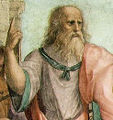Know Thyself. ~ Plato

No discussion of the meaning of life is complete without a discussion of perhaps the most influential of all Western philosophers: Plato. Student of Socrates, teacher of Aristotle, founder of the Academy, he has influenced countless generations of free thinkers and under-the-influence philosophy students. His most famous quote, “Know Thyself,” is not only a favorite of coffee shop artwork, but an extremely simple summary of his philosophical thoughts on the meaning of life.
The foundation of Plato’s philosophy is based on his Theory of Forms, an intense theory that nevertheless resonates. Forms, in essence, are unchangeable, untouchable types, or more clearly, Ideas. These ideas were not able to be sensed in the physical world. Rather, they are essences, typically described as aspatial and atemporal, that is, outside of space and time. They simply exist. Plato postulated that the forms existed in another part of the universe that is more pure than the space which we inhabit.
In Plato’s teaching, there exist ideal Forms which we cannot know, but for which we should nevertheless strive. The ultimate Form, which also informs all the other Forms, is the Form of the Good. In essence, the purpose of human beings is to pursue the Good with the only means available to us: intelligence and reason. The Form of the Good is also recognized as the highest form of knowledge. You must use your rational thought to pursue knowledge, through which search you will pursue the Good, which is what drives all that is good and valued in life.
This may be confusing, but it simplifies to the fact that Plato believed each person must perform their own search for the Good, i.e. the meaning of life. Knowledge and rational thought were the keys, as a good student of the Socratic Method should know. There is little certainty in the philosophy of Plato, which makes it excellent reading for any student of the meaning of life.

No comments yet.